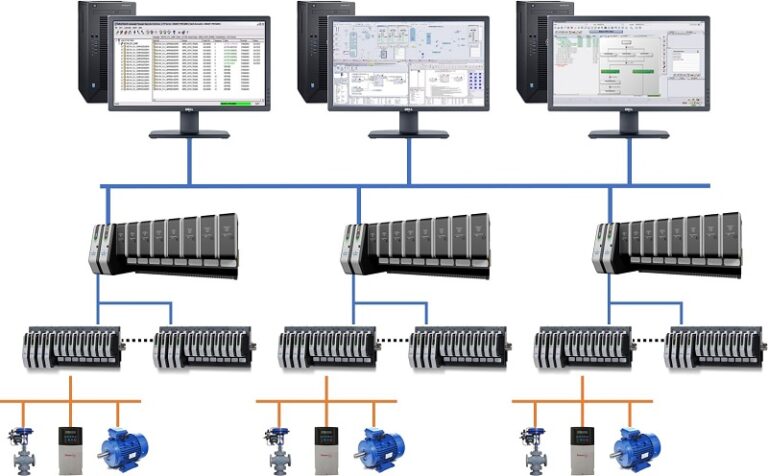In the modern era of industrial automation, efficient control systems are vital for optimizing productivity and ensuring seamless operations. One such system that has revolutionized the industrial landscape is the Distributed Control System (DCS). This article delves into the intricacies of DCS, its components, advantages, and applications. So, let’s explore how DCS has transformed industrial control and monitoring processes.
Definition and Overview
A Distributed Control System (DCS) is an advanced automation solution that manages and controls industrial processes, allowing for precise monitoring and real-time decision-making. Unlike traditional control systems, DCS divides the control tasks across multiple controllers, ensuring efficient distribution of workload and optimal performance.
Evolution of DCS
DCS technology has evolved significantly over the years. Initially, industrial control systems relied on centralized control rooms with hardwired connections. However, advancements in computing and networking led to the development of distributed control systems. These systems revolutionized industrial automation by decentralizing control and enabling enhanced flexibility and scalability.
Components of a DCS
A DCS comprises several interconnected components that work together to achieve seamless control and monitoring of industrial processes. Let’s explore the key components of a typical DCS.
Processors
Processors form the core of a DCS and are responsible for executing control algorithms, acquiring data from field devices, and managing system performance. These processors have high processing power, allowing for complex calculations and rapid response times.
Input/Output Subsystem
The input/output (I/O) subsystem connects the DCS to the field devices such as sensors, actuators, and switches. It facilitates the exchange of data between the control system and the physical processes, enabling real-time monitoring and control.
Operator Interface
The operator interface provides a user-friendly platform for operators to interact with the DCS. It includes graphical displays, control panels, and alarms to visualize and control the industrial processes effectively.
Communication Network
A robust and reliable communication network connects the various components of a DCS, enabling seamless data exchange and synchronization. It ensures that information flows smoothly between the processors, I/O subsystem, and operator interface.
Advantages of DCS
DCS offers numerous advantages that contribute to improved productivity, efficiency, and operational reliability in industrial settings. Let’s explore some key benefits of using a Distributed Control System.
Scalability and Flexibility
DCS offers high scalability, allowing for easy expansion and modification of control systems as per the evolving industrial requirements. Additional controllers and I/O modules can be seamlessly integrated into the existing infrastructure, making DCS flexible and adaptable to changing needs.
Redundancy and Fault Tolerance
Redundancy is a crucial feature of DCS that ensures system reliability and fault tolerance. In the event of a failure or breakdown, redundant controllers and communication paths take over, preventing downtime and minimizing the impact on operations.
Centralized Monitoring and Control
DCS provides centralized monitoring and control, enabling operators to oversee multiple processes simultaneously. Real-time data acquisition, analysis, and visualization empower operators to make informed decisions quickly, optimizing production and resource allocation.
Improved Efficiency and Productivity
With its advanced automation capabilities, DCS streamlines industrial processes, reducing manual intervention and eliminating repetitive tasks. This enhances efficiency, productivity, and overall plant performance.
Applications of DCSs
Distributed Control System finds extensive applications across various industries, contributing to improved safety, reliability, and productivity. Let’s explore some prominent sectors where DCS plays a vital role.
Oil and Gas Industry
In the oil and gas industry, DCS facilitates precise monitoring and control of critical operations such as drilling, refining, and pipeline management. It ensures efficient utilization of resources, reduces downtime, and enhances safety.
Power Generation
DCS plays a pivotal role in power generation plants, enabling efficient control and monitoring of turbines, generators, and other equipment. It optimizes energy production, facilitates load balancing, and ensures stable and reliable power supply.
Chemical Processing
In chemical processing plants, DCS ensures accurate control of various parameters such as temperature, pressure, and flow rates. It enables precise dosing, improves reaction efficiency, and ensures compliance with safety regulations.
Manufacturing and Assembly
Distributed Control System enhances productivity and quality control in manufacturing and assembly processes. It enables seamless coordination of machines, robots, and conveyors, ensuring smooth production flows, reduced waste, and timely delivery of products.
Future Trends in DCSs
As technology continues to advance, DCS is poised to embrace new developments that further enhance its capabilities. Here are some future trends to watch out for:
Integration with IoT and Big Data
DCS will integrate with the Internet of Things (IoT) and Big Data analytics, enabling real-time data acquisition from a wide range of interconnected devices. This integration will unlock powerful insights, predictive maintenance, and process optimization opportunities.
Cybersecurity Measures
As industrial systems become more connected, robust cybersecurity measures will be crucial to safeguard critical infrastructure from cyber threats. Distributed Control System will incorporate advanced security protocols to ensure the integrity and confidentiality of data.
Artificial Intelligence and Machine Learning
The integration of DCS with artificial intelligence and machine learning algorithms will enable advanced process optimization, anomaly detection, and predictive analytics. These technologies will empower DCS to proactively identify and resolve potential issues, improving operational efficiency.
Conclusion
Distributed Control Systems have transformed industrial automation, enabling efficient control, monitoring, and optimization of complex processes. With their scalable architecture, real-time data acquisition, and advanced automation capabilities, DCS has become a cornerstone of modern industrial control systems. As technology continues to evolve, we can expect DCS to further revolutionize industrial operations, paving the way for increased efficiency, productivity, and safety.
